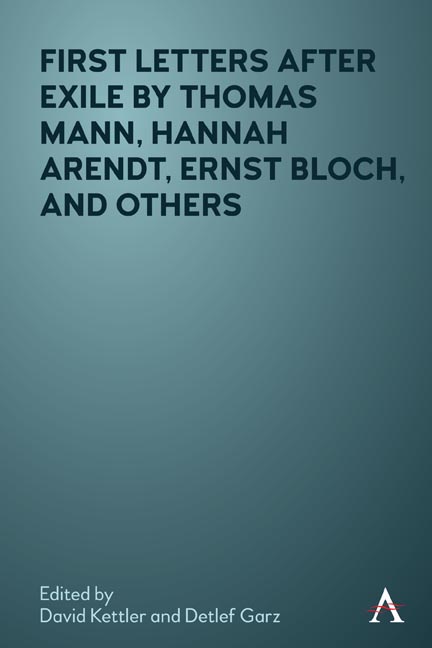Book contents
- Frontmatter
- Contents
- Preface
- Chapter 1 The “First Letters” Exile Project: Introduction
- Chapter 2 “That I Will Return, My Friend, You Do Not Believe Yourself ”: Karl Wolfskehl – Exul Poeta
- Chapter 3 “I Do Not Lift a Stone”: Thomas Mann’s “First Letter” to Walter von Molo
- Chapter 4 Faust Narrative and Impossibility Thesis: Thomas Mann’s Answer to Walter von Molo
- Chapter 5 “That I Am Not Allowed for a Moment to Forget the Ocean of Blood”: Hans-Georg Gadamer and Leo Strauss in Their First Letters after 1946
- Chapter 6 Return into Exile: First Letters to and from Ernst Bloch
- Chapter 7 A Postwar Encounter without Pathos: Otto Kirchheimer’s Critical Response to the New Germany
- Chapter 8 An Exile’s Letter to Old Comrades in Cologne: Wilhelm Sollmann’s Critique of German Social Democracy and Conception of a New Party in Postwar Germany
- Chapter 9 First Letters: Arendt to Heidegger
- Chapter 10 Denazification and Postwar German Philosophy: The Marcuse/Heidegger Correspondence
- Chapter 11 “It Would Be Perhaps a New Exile and Perhaps the Most Painful”: The Theme of Return in Oskar Maria Graf ’s Letters to Hugo Hartung
- Chapter 12 Social Constellation of the Exile at the End of the Second World War and the Pragmatics of the “First Letters”: An Objective Hermeneutic Structural and Sequence Analysis
- Notes on Contributors
- Index
Chapter 8 - An Exile’s Letter to Old Comrades in Cologne: Wilhelm Sollmann’s Critique of German Social Democracy and Conception of a New Party in Postwar Germany
Published online by Cambridge University Press: 25 February 2022
- Frontmatter
- Contents
- Preface
- Chapter 1 The “First Letters” Exile Project: Introduction
- Chapter 2 “That I Will Return, My Friend, You Do Not Believe Yourself ”: Karl Wolfskehl – Exul Poeta
- Chapter 3 “I Do Not Lift a Stone”: Thomas Mann’s “First Letter” to Walter von Molo
- Chapter 4 Faust Narrative and Impossibility Thesis: Thomas Mann’s Answer to Walter von Molo
- Chapter 5 “That I Am Not Allowed for a Moment to Forget the Ocean of Blood”: Hans-Georg Gadamer and Leo Strauss in Their First Letters after 1946
- Chapter 6 Return into Exile: First Letters to and from Ernst Bloch
- Chapter 7 A Postwar Encounter without Pathos: Otto Kirchheimer’s Critical Response to the New Germany
- Chapter 8 An Exile’s Letter to Old Comrades in Cologne: Wilhelm Sollmann’s Critique of German Social Democracy and Conception of a New Party in Postwar Germany
- Chapter 9 First Letters: Arendt to Heidegger
- Chapter 10 Denazification and Postwar German Philosophy: The Marcuse/Heidegger Correspondence
- Chapter 11 “It Would Be Perhaps a New Exile and Perhaps the Most Painful”: The Theme of Return in Oskar Maria Graf ’s Letters to Hugo Hartung
- Chapter 12 Social Constellation of the Exile at the End of the Second World War and the Pragmatics of the “First Letters”: An Objective Hermeneutic Structural and Sequence Analysis
- Notes on Contributors
- Index
Summary
Wilhelm Sollmann was the most prominent Social Democratic politician of the Weimar Republic in the German emigration in America who did not return to his homeland permanently after the Second World War. From a distance in 1945 and 1946, he followed closely the revival of political life on the local level in the American and British occupation zones, especially in Cologne, which he had represented in the Reichstag up to 1933. The British military government permitted the Social Democrats and other non-Nazi groups to organize political parties as early as the summer of 1945 and granted a license to Social Democratic leaders in Cologne in February 1946 to resume the publication of the Rheinische Zeitung, the party's newspaper that had been banned by the Nazi dictatorship. Sollmann waded into an intraparty debate in Cologne on the future path of Social Democracy when he addressed a long letter on August 11, 1946, to Johannes Meerfeld, a 75-year-old comrade and the former chief editor of the newspaper. Should the party's surviving old guard reestablish the pre-1933 working-class party with its historic heritage of Marxism or construct a new programmatic foundation for Social Democracy and form a party of the people? On the contents of his letter, he explained afterward: “For many years now, I have felt what is written there. But I would never have been able to express it in this way without the lengthy emigration. The emigration is a remarkable school of life.”
Sollmann's letter to Meerfeld in 1946 became a widely read public letter in the American and British occupation zones. Sollmann sent copies of his letter to Heinz Kühn and Willi Eichler, the editors of the Rheinische Zeitung, and other Social Democratic comrades, and it was published in newspapers in Cologne and other cities. The letter to Meerfeld and, indeed, a large part of Sollmann's Nachlass provide fresh evidence for a deeper understanding of the complex relationship of a political refugee to his old Heimat and for a study of how a Social Democratic Reichstag deputy in exile reexamined the traditional social and ideological structures of his party and sought to transform it from a Klassenpartei into a Volkspartei in the early postwar period, 13 years before the Social Democrats “modernized” the party's program and public image at their congress in Godesberg in 1959.
- Type
- Chapter
- Information
- Publisher: Anthem PressPrint publication year: 2021

